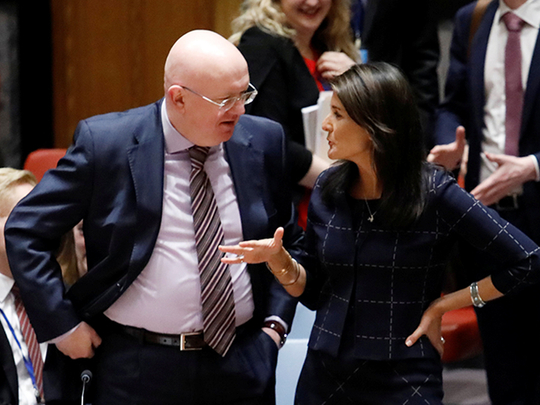
Washington: President Donald Trump was watching television on Sunday when he saw Nikki Haley, his ambassador to the United Nations, announce that he would impose fresh sanctions on Russia. The president grew angry, according to an official informed about the moment. As far as he was concerned, he had decided no such thing.
It was not the first time Trump has yelled at the television over something he saw Haley saying. This time, however, the divergence has spilled into public in a remarkable display of discord that stems not just from competing views of Russia but from larger questions of political ambition, jealousy, resentment and loyalty.
The rift erupted into open conflict on Tuesday when a White House official blamed Haley’s statement about sanctions on “momentary confusion.” That prompted her to fire back, saying that she did not “get confused.” The public disagreement embarrassed Haley and reinforced questions about Trump’s foreign policy — and who speaks for his administration.
At the least, the episode highlighted the crossed circuits over foreign policy in an administration with no secretary of state, an increasingly marginalised White House chief of staff and a national security adviser who has only been on the job for a week and has pushed out many of the senior national security officials in the White House but has yet to bring in his own team.
Since Trump fired Secretary of State Rex Tillerson last month, Haley has been the administration’s leading foreign policy figure. And yet she was not kept in the loop on a major decision involving perhaps America’s most powerful adversary.
According to several officials, the White House did not inform Haley that it had changed course on sanctions, leaving her to hang out alone.
“It damages her credibility going forward and once again makes everyone, friend and foe alike, wonder that when the United States says something, approves something, calls for something, opposes something, is it for real?” said Rep. Gerald E. Connolly, D-Va. and a member of the House Foreign Affairs Committee. “Should we wait to see what Trump does the next day?”
The clash was reminiscent of various occasions when Trump has directly undercut subordinates, as when Tillerson broached the idea of negotiations with North Korea and the president scolded him on Twitter not to waste his time. Many in Washington and at the United Nations were riveted by the sharp exchange on Tuesday between the White House and its senior international diplomat.
“She got ahead of the curve,” Larry Kudlow, the president’s national economics adviser, told reporters at a briefing in Florida before Trump welcomed Prime Minister Shinzo Abe of Japan to his Mar-a-Lago estate. “She’s done a great job. She’s a very effective ambassador, but there might have been some momentary confusion about that.”
Haley took umbrage. A few hours later, she spoke with Dana Perino of Fox News, who quoted her response on air: “With all due respect, I don’t get confused.”
Kudlow then called Haley to apologise. “She was certainly not confused,” Kudlow told The New York Times by telephone. “I was wrong to say that — totally wrong.”
He added: “As it turns out, she was basically following what she thought was policy. The policy was changed and she wasn’t told about it, so she was in a box.”
The argument that Haley had merely gotten out ahead of a decision was undercut by the fact that the White House itself had sent out word to surrogates on Saturday — the day before her remarks — letting them know that it had decided to take punitive action against Moscow.
“We also intend to impose specific additional sanctions against Russia to respond to Moscow’s ongoing support for the [Al] Assad regime, which has enabled the regime’s atrocities against the Syrian people,” said a document distributed by the Republican National Committee that was titled “White House talking points.”
And yet an administration official said there was a quick recognition on Sunday that Haley had gone too far in her remarks on “Face the Nation” on CBS.
This official said that the State Department called an aide to Haley shortly after she appeared on the show, to suggest she issue a correction. Haley’s aide replied that her office was considering a correction, but none was ever released. Instead, the White House was left to say the next day that no sanctions had been approved.
Such conflicts leave foreign governments in a bind as they try to interpret American moves.
“Coordinated messaging by our government on matters as serious as these is very important, so it is best that an episode such as this one not be repeated,” said John Negroponte, a former ambassador to the United Nations. He added that he was confident that Haley “has absolutely no interest in undercutting, contradicting or getting out in front of the White House.”












